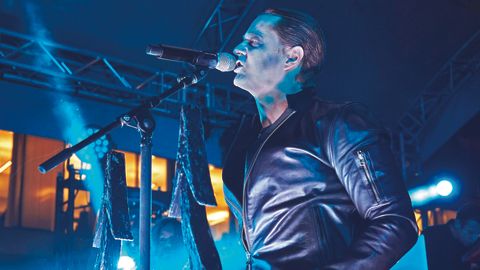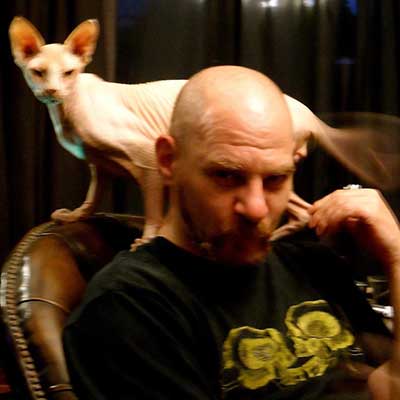If you’re a first-time visitor to Oslo, it can be a little disappointing to discover that the city isn’t actually awash with scowling metalheads, and that even the black metal emporiums such as the Neseblod record store – on the site of the legendary Helvete shop – is more likely to be populated with tourists. This Friday, however, if they’re not exactly out in force, there’s a notable uptick of dyed-in-the-goat-wool metal fans dispersed amongst the city centre, sitting in bars, clutching bags of vinyl, biding their time, waiting for Satyricon to show up downtown.
Despite having cut their own, purposeful path far beyond the clutches of the underground – to the consternation of some – Satyricon are clearly still a big deal in their hometown and a source of local pride. Today is the launch of 11th album Deep Calleth Upon Deep and the band are celebrating by playing it in full to a small, fortune-blessed audience, on the roof of a building, preceded by a signing session for all-comers. Rare and old vinyl is offered to a surprised Satyr Wongraven and drummer Frost, suggesting that for a band who have travelled so far musically in the two decades-plus from their Dark Medieval Times debut album, and for all the fresh blood they’ve rallied to their cause in recent years, they’ve inspired a deep level of loyalty amongst the thoroughbred fans.
The gig itself isn’t in some arcane part of the city steeped in black metal lore; it’s in a business district in one of the posher parts of town. Cross a bridge from the city centre over the train tracks and you’ll be faced with an imposing, ultra-modern array of office buildings, each trying to outdo the other in angular and irregularly modular, brash eccentricity. Past them and facing the waterfront is the Barcode Project, an upscale stretch of bars and shops and offices, where beer prices are so high you’re likely to get vertigo before you get drunk. Ranged outside is an incongruous-looking queue of expectant fans, waiting to be offered plastic ponchos, ushered up into lifts and be told that no drinks are allowed, and if you go to the loo mid-set, there’s no guarantee you’ll be let back out for the rest of the gig.
Facing out over the bay, and flanked by office blocks (with a few curious late workers looking down from an overlooking window), this might not seem like the most suitable spot for a black metal band, but in Satyricon’s case, it kind of fits. Ever since 1999’s Rebel Extravaganza, Satyricon’s music has been a process of discipline and distillation, streamlining black metal’s wilful momentum into a clinical, urban stomp – a smelting down of tradition and forging something gleaming and potent from its ore. That Deep Calleth Upon Deep is the first album to be released since Satyr’s diagnosis of a thankfully benign brain tumour suggests extra forces of will have been summoned in its making.
As a sharp rain starts to hone in on the crowd, the band appear one by one to ecstatic, expectant cheers, Satyr himself arriving last and corpsepainted in keeping with the Edvard Munch-drawn figure on the album’s cover, lacking only the Yorick-like skull to complete the effect. The minute the strident, steel-drilling riff of Midnight Serpent erupts, the entire crowd becomes unified in submission, Satyr himself craning his gaze over his podium and the crowd as if inspecting recently conquered terrain. If it feels like Satyricon have returned to familiar ground after the curveball of their last, self-titled album, the sensation is still immediate and revelatory. It’s not in Satyr’s nature to look back or rely on past glories, though, and woven around their tungstenmouldedchassis these new tracks reveal a new range of dynamic detours and rhythmic shifts as sturdily modernistic yet deviantly reconstructed as the buildings nearby. Midnight Serpent shifts tempo around Satyr’s clotted croak and brewing storm of riffs, Blood Cracks Open The Ground’s progressive ruminations morph as if searching for its optimum groove, and the determined pilgrimage of To Your Bretheren In The Dark takes on an emotional scope that casts the band in fresh new lights. The luminous, rolling rhythm that rises out of Deep Calleth Upon Deep’s grinding riffs is another unforgettable highlight that’s going to burn itself into the band’s canon, given added breadth by Håkon Kornstad’s operatic vocal accompaniment.
Satyricon’s magic relies on precision, and the entire band aren’t just on point throughout; they look as deliriously welded to their battlement-pummelling, effortlessly recalibrating groove as we are. Black Wings And Withering Gloom takes black metal’s frostbitten hunting grounds as a starting point and then twists them into towering new forms, and as Burial Rite’s ever-shifting centre of gravity has an entire rooftop precipitously losing their shit at the band’s command, it’s clear that Satyricon’s resolute drive is taking them into an exhilarating new era. The encores – the anthemic Mother North and the cauldron-stirring incantation of K.I.N.G – may be predictable, but they’re a potent arsenal.
“There were times when I thought, ‘This is my city’,” says Satyr at a press conference – a launch for a new champagne to join his Wongraven wine stable – after the show. “There were moments when I could see the hills and islands in the distance and that made me think, ‘We’re home.’” It’s an elevated vantage point Saytr has chosen, and tonight it feels entirely fitting.


